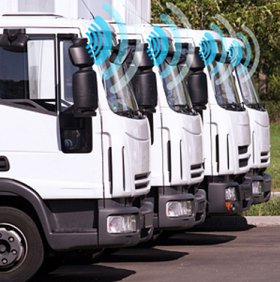
By Geotab
March 20, 2023
In 2020, transportation accounted for 27% of US greenhouse gas emissions, the largest portion of total emissions. Of this, light-duty vehicles and medium to heavy-duty trucks contributed 83%. Along with the rise in GHG emissions comes an increased demand by consumers for eco-friendly alternatives. According to the TCS retail consumer survey, 86% of consumers care about sustainability when sourcing products and 62% are more inclined to spend with companies that actively practice sustainability.
Regarding fleet management, industry standards have moved towards greater sustainability and efficiency over the last several years with the introduction of electric vehicle fleets, telematics for route optimization and efficiency, and alternative fuel options. Practicing sustainability in fleet management is essential for becoming a leader in the industry and landing more clients searching for sustainable practices in their supply chain leaders. This article will take a closer look at some of the sustainable practices becoming standard within the industry and the challenges facing transportation leaders in an increasingly green marketplace.
Electric Fleets
According to the Bloomberg Electric Vehicle Outlook 2022, “EV sales are surging due to a combination of policy support, improvements in battery technology, more changing infrastructure and new compelling models from automakers.” Still, only 1% of EV sales are trucks and fleet vehicles. However, this percentage will likely increase as industry standards evolve to meet the increasing demand for eco-friendly transportation networks.
 The adoption of electric vehicles presents several advantages for fleet management, the most important being the significant reduction of emissions. With electric vehicle fleet solutions, transportation groups can increase their profitability by setting fuel economy standards across their networks and monitoring driver behavior to find opportunities for efficiency. Geotab is a leader in fleet sustainability software and management.
The adoption of electric vehicles presents several advantages for fleet management, the most important being the significant reduction of emissions. With electric vehicle fleet solutions, transportation groups can increase their profitability by setting fuel economy standards across their networks and monitoring driver behavior to find opportunities for efficiency. Geotab is a leader in fleet sustainability software and management.
With Geotab’s EV Suitability Assessment and Sustainability Solutions, fleet networks can understand the viability of electric fleets and compare their cost savings with other electric fleets in the US and abroad. With Geotab’s Green Fleet Dashboard, fleet managers can track driver behavior to encourage efficient driving practices, compare their vehicle network to other EV fleets, and monitor cost and savings with electric fleet vehicles.
Challenges Facing EV Fleets
Though electric fleet vehicles are growing in popularity, several challenges face the adoption of EVs in the transportation industry. The up-front cost of replacing gas vehicles with EVs is one barrier facing transportation experts. Though these investments will pay off in the long run, the initial cost of hardware, software, and training can be challenging for some fleet networks.
Another challenge facing EV fleets and personal electric vehicles is access to charging stations across their delivery network. McKinsey Research predicts that “by 2030, the US market for energy-optimization services to support the charging of electric vehicle fleets could be worth $15 billion per year.” Transport leaders will likely implement fully electric fleets as the national infrastructure improves to support large-scale EV fleets.
Alternative Fuel Options
Apart from EVs, several other sustainable fuel alternatives are available to fleet managers. These include hydrogen, propane, natural gas, and biofuels. These fuels emit fewer greenhouse gasses than gasoline and diesel, making them a viable option for companies that want to reduce their carbon footprint.
Hydrogen Fuel Cells
Hydrogen fuel cells are a promising alternative fuel option for fleet managers. They produce electricity by combining hydrogen and oxygen, emitting only water vapor and heat as byproducts. The fuel cell technology offers a longer driving range than battery-powered electric vehicles and can refuel in minutes. The US Department of Energy’s SuperTruck program is an excellent example of innovation within the alternative fuel industry.
 The SuperTruck program funds private and public research and development into sustainable fleet management, including alternative fuels, improved electric batteries, and more. Phase 3 of the SuperTruck program involves collaboration with five major commercial vehicle manufacturers to develop efficient hydrogen fuel cell technologies that will target efficiency improvements for Class 8 heavy-duty trucks. These researchers seek to improve alternative fuel options and ensure heavy-duty hydrogen-powered fleets can cut costs while matching the performance, payload, and range of diesel fleets.
The SuperTruck program funds private and public research and development into sustainable fleet management, including alternative fuels, improved electric batteries, and more. Phase 3 of the SuperTruck program involves collaboration with five major commercial vehicle manufacturers to develop efficient hydrogen fuel cell technologies that will target efficiency improvements for Class 8 heavy-duty trucks. These researchers seek to improve alternative fuel options and ensure heavy-duty hydrogen-powered fleets can cut costs while matching the performance, payload, and range of diesel fleets.
Natural Gas
Propane and natural gas are other alternative fuel options that can reduce greenhouse gas emissions. Propane is a byproduct of natural gas processing and petroleum refining, while natural gas is a fossil fuel. Both fuels are widely available and can be used in compressed or liquefied form. According to the Alternative Fuels Data Center, propane and natural gas produce fewer emissions than gasoline and diesel vehicles. While natural gas vehicles can hold slightly less fuel than gasoline trucks, a dual-fuel engine has been shown to improve the sustainability and performance of natural gas vehicles. However, these engines can add complexity to fuel storage.
Biofuels
Biofuels are another sustainable fuel option that can reduce greenhouse gas emissions. They are made from renewable sources, such as plant and animal fats and oils. Biofuels can be blended with gasoline and diesel, reducing greenhouse gas emissions. Biofuels are produced in the US, and more OEMs are introducing biofuel-compatible hardware to improve emissions for heavy-duty and personal commercial vehicles.
Telematics for Tracking and Optimization
Telematics is a rapidly evolving field that has revolutionized how fleet management operates. With an increased emphasis on efficiency, telematics has become an essential tool for achieving sustainable fleet management. By using advanced technologies to gather data on vehicle performance, telematics can provide fleet managers with critical insights to help reduce fuel consumption, optimize routes, improve driver safety, and minimize vehicle emissions.
 Telematics systems can monitor and analyze data on driver behavior, fuel usage, and vehicle maintenance, enabling fleet managers to identify areas where they can reduce waste and optimize operations. The data collected can be used to implement proactive measures such as driver training programs, route optimization, and preventative maintenance to ensure that vehicles operate at peak efficiency.
Telematics systems can monitor and analyze data on driver behavior, fuel usage, and vehicle maintenance, enabling fleet managers to identify areas where they can reduce waste and optimize operations. The data collected can be used to implement proactive measures such as driver training programs, route optimization, and preventative maintenance to ensure that vehicles operate at peak efficiency.
These measures reduce the fleet’s carbon footprint, lower operating costs, and extend the life of the vehicles. Telematics has been more accessible than ever to implement for modern fleets with tools like Geotab’s comprehensive fleet management software that automatically gathers and reports data across complex transportation networks.
Driver Safety
In addition to reducing fuel consumption and emissions, telematics can improve driver safety by providing real-time data on driving behavior, such as speeding, harsh braking, and acceleration. Fleet managers can use this data to identify drivers who need additional training and implement policies to improve safety. Data-driven safety policies reduce the risk of accidents and can lower your insurance costs and downtime caused by accidents.
Data-Driven Efficiency
Telematics also enables fleet managers to monitor vehicle emissions in real-time, ensuring they remain within legal limits. By analyzing emissions data, fleet managers can identify areas where vehicles need maintenance or replacement to reduce emissions. Emissions reductions help fleets comply with regulations and reduce their environmental impact.
Telematics programs can be tailored to your electric vehicle fleet to help track mileage, plan charging stops, and optimize routes for maximum range and efficiency. Though many fleets may not be able to implement EVs or alternative fuel sources, they can still benefit from telematics to find ways to improve their fleet efficiencies and lower emissions.
Sustainability is the New Standard
 As businesses and consumers search for eco-friendly alternatives for products and services, the transportation industry continues to invest in research and development for sustainable fleet management practices. There are many ways to implement green initiatives into fleet management, from EV fleets to alternative fuel options and telematics for data-driven efficiencies.
As businesses and consumers search for eco-friendly alternatives for products and services, the transportation industry continues to invest in research and development for sustainable fleet management practices. There are many ways to implement green initiatives into fleet management, from EV fleets to alternative fuel options and telematics for data-driven efficiencies.
By adopting sustainable practices, fleet managers can significantly reduce their environmental impact and contribute to a more sustainable future. Transportation leaders will continue to develop and implement sustainable practices that reflect the best standards of the industry and the demand of the green marketplace.




